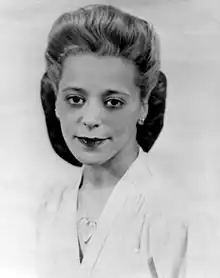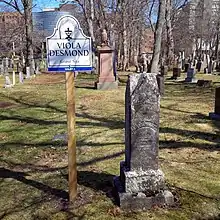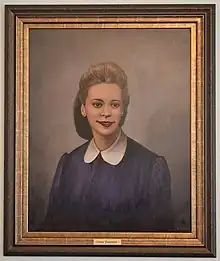Viola Desmond
Viola Irene Desmond (July 6, 1914 – February 7, 1965) was a Canadian civil and women's rights activist and businesswoman of Black Nova Scotian descent. In 1946, she challenged racial segregation at a cinema in New Glasgow, Nova Scotia, by refusing to leave a whites-only area of the Roseland Theatre. For this, she was convicted of a minor tax violation for the one-cent tax difference between the seat that she had paid for and the seat that she used, which was more expensive. Desmond's case is one of the most publicized incidents of racial discrimination in Canadian history and helped start the modern civil rights movement in Canada.
Viola Desmond | |
|---|---|
 Desmond c.1940 | |
| Born | Viola Irene Davis July 6, 1914 Halifax, Nova Scotia, Canada |
| Died | February 7, 1965 (aged 50) New York City, New York, U.S. |
| Resting place | Camp Hill Cemetery, Halifax |
| Nationality | Canadian |
| Occupation(s) | Business owner and beautician |
| Criminal status | Convicted (pardoned April 15, 2010)[1] |
| Spouse | Jack Desmond |
| Conviction(s) | Tax evasion under s. 8(8) of the Theatres, Cinematographs, and Amusements Act, R.S.N.S., 1923, c. 162[1] |
| Criminal penalty | Fine and court costs amounting to $26 (reversed by free pardon[2]) |
Date apprehended | November 8, 1946 |
In 2010, Desmond was granted a posthumous free pardon, the first to be granted in Canada.[3][4] A free pardon deems the person granted the pardon to have never committed the offence and cancels any consequence resulting from the conviction, such as fines, prohibitions or forfeitures.[5] However, it was not until 2021 that the government repaid the $26 (now $324 CAD as of 2023) fine to her estate in the form of a $1,000 scholarship that adjusted the amount to reflect the time value of money.[2] The Crown-in-Right-of-Nova Scotia also apologized for prosecuting her for tax evasion and acknowledged she was rightfully resisting racial discrimination.[6] In 2016, the Bank of Canada inaccurately announced that Desmond would be the first Canadian woman to be featured on the front of a Canadian banknote.
In late 2018, Desmond became the first Canadian-born woman to appear alone on a Canadian bank note—a $10 bill—which was unveiled by Finance Minister Bill Morneau and Bank of Canada Governor Stephen Poloz during a ceremony at the Halifax Central Library on March 8, 2018.[7][8] Desmond was also named a National Historic Person in 2018.[9]
Biography
Viola Desmond was born on July 6, 1914, one of ten children of James Albert and Gwendolin Irene (née Johnson) Davis.[10] Viola was raised by her father and mother in Halifax. Viola's father worked as a stevedore for a number of years before he became a barber.[11][12]
Growing up, Desmond noted the absence of professional hair and skin-care products for black women and set her sights on addressing this need.[13][10] Being of African descent, she was not allowed to train to become a beautician in Halifax, so she left and received beautician training in Montreal, Atlantic City, and one of Madam C. J. Walker's beauty schools in New York. Upon finishing her training, Desmond returned to Halifax to start her own hair salon called Vi's Studio of Beauty Culture. Her clients included Portia White and Gwen Jenkins, later the first black nurse in Nova Scotia.[14]
.jpg.webp)
In addition to the salon, Desmond opened The Desmond School of Beauty Culture so that black women would not have to travel as far as they had to receive proper training. Catering to women from Nova Scotia, New Brunswick and Quebec, the school operated using a vertical integration framework.[10][15] Students were provided with the skills required to open their own businesses and provide jobs for other black women within their communities. Each year as many as fifteen women graduated from the school, all of whom had been denied admission to whites-only training schools.[10] Desmond also started her own line of beauty products, Vi's Beauty Products, which she marketed and sold herself.[11][12][14][16]
Arrest
Viola Desmond joined her husband Jack Desmond in a combined barbershop and hairdressing salon on Gottingen Street. On November 8, 1946, while she was on a business trip to Sydney to sell her beauty products, Viola Desmond's car broke down in New Glasgow. She was told that she would have to wait a day before the parts to fix it became available. To pass the time while waiting, she went to see The Dark Mirror[17] starring Olivia de Havilland at the Roseland Film Theatre.[18]

There were no segregation laws for movie theatres in Nova Scotia, and the theatre had no sign telling its patrons about the policy, but main floor seats were reserved for white patrons, a discriminatory practice permitted in all Canadian provinces. Desmond was sold a ticket to the balcony. Unaware of the segregation and, being nearsighted, she went to sit in the floor section to be close to the screen. When she was asked to move, she realized what was happening, and refused to move because she had a better view from the main floor. When she requested to exchange her balcony ticket to the main floor for an additional cost, she was refused and forcefully removed from the theatre which caused an injury to her hip. She was also arrested and spent 12 hours in jail, and had to pay a $26 fine for tax evasion. The tax on the balcony price of 30 cents was two cents; the tax on the floor price of 40 cents was three cents. She was convicted of depriving the government of one cent in tax.[12] Desmond was kept in jail overnight and was never informed about her right to legal advice, a lawyer, or bail.[16][18]
Upon returning to Halifax, Desmond discussed the matter with her husband, and his advice was to let it go. However, she then sought advice from the leaders of her church, the Cornwallis Street Baptist Church, where the Minister William Pearly Oliver and his wife Pearline encouraged her to take action. With their support, Desmond decided to fight the charge in court.
Trials
Following the decision to fight the charge, Carrie Best broke the story of Desmond in the first edition of The Clarion, the first black-owned and published Nova Scotia newspaper.[19] Best closely covered the story of Desmond on front page as she had herself previously confronted the racial segregation of the Roseland Theatre.[20]
With the help of her church and the Nova Scotia Association for the Advancement of Coloured People (NSAACP), Desmond hired a lawyer, Frederick William Bissett, who represented her in the criminal trials and attempted, unsuccessfully, to file a lawsuit against the Roseland Theatre.
During subsequent trials the government insisted on arguing that this was a case of tax evasion. A provincial act regulating cinemas and movie theatres required the payment of an amusement tax based on the price of the theatre ticket. Since the theatre would only agree to sell Desmond a cheaper balcony ticket, but she had insisted upon sitting in the much more expensive main floor seat, she was only one cent short on tax. The statute used to convict Desmond contained no explicitly racist or discriminatory language.
Bissett's decision to opt for a judicial review rather than appeal the original conviction proved disastrous. Desmond's lawyer tried to appeal the decision on the basis of her being wrongfully accused of tax evasion, not on the basis of racial discrimination.[21] When dismissing the case, Justice William Lorimer Hall said:
Had the matter reached the court by some other method than certiorari there might have been an opportunity to right the wrong done this unfortunate woman. One wonders if the manager of the theatre who laid the complaint was so zealous because of a bona fide belief that there had been an attempt to defraud the province of Nova Scotia of the sum of one cent, or was it a surreptitious endeavour to enforce a Jim Crow rule by misuse of a public statute.
— Justice William Lorimer Hall, when dismissing Desmond's application (1947)[22]
Her lawyer, Bissett, refused to bill Desmond, and the money was used to support William Pearly Oliver's newly established NSAACP.
Later life
After the trial and encounter with the legal system of Nova Scotia, her marriage ended. Desmond closed her business and moved to Montreal where she could enroll in a business college. She eventually settled in New York City, where she died from gastrointestinal bleeding on February 7, 1965, at the age of 50.[23] She is buried at Camp Hill Cemetery in Halifax, Nova Scotia.
Legacy

William Pearly Oliver later reflected on Desmond's legacy:
... this meant something to our people. Neither before or since has there been such an aggressive effort to obtain rights. The people arose as one and with one voice. This positive stand enhanced the prestige of the Negro community throughout the Province. It is my conviction that much of the positive action that has since taken place stemmed from this ...
— William Pearly Oliver, reflecting on the case 15 years later.[24]
Desmond is often compared to Rosa Parks, given they both challenged racism by refusing to vacate seats in "Whites Only" sections and contributed to the rise of the Civil Rights Movement. Despite Nova Scotia and other Canadian provinces having Jim Crow laws, for instance in education,[25][26] there was no law specifically enforcing segregation in theatres.[27]
Commemorations

On 28 January 2019, Temma Frecker, a Nova Scotia teacher at The Booker School, was awarded the Governor General's History Award for her class's proposal to build a statue of Desmond in Cornwallis Park. Her proposal was to include the existing Edward Cornwallis statue among three other statues of Acadian Noël Doiron, Black Nova Scotian Viola Desmond and Mi'kmaq Chief John Denny Jr. The four statutes would be positioned as if in a conversation with each other, discussing their accomplishments and struggles.[28][29]
Cape Breton University established a scholarship campaign in the names of Viola Desmond and her sister Wanda Robson, and named a Chair in Social Justice after Desmond.[30]
In 2010, Mayann E. Francis Lieutenant Governor of Nova Scotia unveiled a portrait of Desmond which is on permanent display in the Ballroom at Government House (Nova Scotia).[31]

In 2012, Desmond was portrayed on a commemorative stamp issued by Canada Post.[32]
On July 7, 2016, a Halifax harbour ferry was launched bearing her name.[33]
Viola Desmond was, on December 8, 2016, chosen from a shortlist of five to be the first Canadian-born woman,[34] the fourth woman (after Queen Mary,[35] Princess Mary, Princess Royal and Countess of Harewood,[36] and Queen Elizabeth II), and the first non-royal to appear on her own on a Canadian banknote, to celebrate her achievements in the civil rights movement.[37] In so doing, she also became the first black person featured in that way.[41] On November 26, 2018, the Bank of Canada revealed the new design of the ten-dollar banknote, showing Desmond's effigy on the obverse and,[42][43] on the back, a map of Halifax's historic north end and the Canadian Museum for Human Rights in Winnipeg, Manitoba.
Desmond was named a National Historic Person on January 12, 2018.[9]
In June 2018, Canada's Walk of Fame star was unveiled at the Halifax Ferry Terminal.[44]
In June 2018, at the request of a local city councillor, Scarborough community council approved the renaming of Hupfield Park as Viola Desmond Park. The park is located in the Malvern neighbourhood of Scarborough within Toronto.[45]
In July 2018, a short stretch of Forbes Street in New Glasgow outside of the former Roseland Theatre was renamed Viola's Way.[46]
In February 2019, Royal Canadian Mint announced the release of first Black History Month coin, a pure silver coin featuring Viola Desmond.[47]
In April 2019, the International Bank Note Society (IBNS) selected Canadian ten-dollar note featuring Viola Desmond to receive Bank Note of the Year Award for 2018.[48]
In April 2021, the Hamilton-Wentworth District School Board announced a new elementary school named after Desmond. The Viola Desmond Elementary School educates 682 students in kindergarten through to Grade 8 and opened in September 2021.[49]
In November 2022, the Toronto International Film Festival announced that the largest screening room at the TIFF Bell Lightbox will be named the Viola Desmond Theatre in 2023.[50]
The Arts
In 2000, Desmond and other Canadian civil rights activists were the subject of a National Film Board of Canada documentary Journey to Justice.[51] A documentary film was made about her, entitled Long Road to Justice: The Viola Desmond Story.[16]
Her sister, Wanda Robson (1926-2022),[52] wrote a book about activism in her family and her experiences with her sister, titled Sister to Courage.[53] Desmond was also the subject of a children's book Viola Desmond Won't Be Budged by Jody Nyasha Warner.[54]
Singer Faith Nolan wrote a song about her.[55]
On February 2, 2016, Historica Canada featured Desmond in a Heritage Minute,[56] filmed in High River, Alberta, in June 2015. The video features Kandyse McClure as Viola Desmond.[57] She became the first historical woman of colour to feature in a Heritage Minute.[18]
Google's July 6, 2018 Doodle, created by Google artist Sophie Diao, celebrates the life and legacy of Viola Desmond, and was distributed across Canada.[58]
Desmond's life and broader issues of racial discrimination in Canada are the subject of a play developed by Toronto playwright Andrea Scott. Controlled Damage was produced by Halifax's Neptune Theatre in association with b current productions of Toronto. The play premiered at Neptune on 4 February 2020 with Halifax actress Deborah Castrilli in the role of Viola Desmond.[59]
Apology and pardon
On April 14, 2010, the Lieutenant Governor of Nova Scotia, Mayann Francis, on the advice of Premier Darrell Dexter, invoked the royal prerogative and granted Desmond a posthumous free pardon,[3] the first to be granted in Canada.[4] The free pardon, an extraordinary remedy granted under the royal prerogative of mercy only in the rarest of circumstances and the first one granted posthumously, differs from a simple pardon in that it is based on innocence and recognizes that a conviction was in error.[4] Francis, herself a Black Canadian, remarked, "here I am, 64 years later—a black woman giving freedom to another black woman".[18]
The Premier also made an apology.[6] Desmond's younger sister, Wanda Robson, and Graham Reynolds, a professor of Cape Breton University, worked with Cabinet to ensure that Desmond's name was cleared; there was a public acknowledgement of the injustice and the Crown-in-Council reaffirmed its commitment to human rights. The provincial government declared in February 2015 the first Nova Scotia Heritage Day in Desmond's honour.[32] Desmond's portrait also hangs in Government House, in Halifax.
Prompted by a request from Ontario high school student Varishini Deochand in 2021, the government of Nova Scotia offered a symbolic repayment of Desmond's original court fees to her only surviving family member, Robson. When Robson said she would use the money to make a one-time donation for a scholarship at Cape Breton University, the Crown-in-Council increased the repayment from the current valuation of $368.29 to $1,000. The provincial Crown also issued a commemorative cheque to display in the legislature. Original court costs were $26.[2]
See also
References
- "Grant of Free Pardon VIOLA IRENE DAVIS DESMOND" (PDF). Government of Nova Scotia. Government of Nova Scotia. April 15, 2010. Retrieved August 15, 2022.
- Pottie, Erin (February 3, 2021). "Student project spurs Nova Scotia to repay fine levied against Viola Desmond". CBC News. Retrieved February 4, 2021.
- Carlson, Kathryn Blaze (April 14, 2010). "'Canada's Rosa Parks,' Viola Desmond, posthumously pardoned". National Post. Archived from the original on April 18, 2010. Retrieved April 14, 2010.
- "Late Viola Desmond Granted Apology, Free Pardon". NovaScotia, Canada. April 15, 2010. Archived from the original on May 2, 2014. Retrieved May 1, 2014.
- "What are the different types of clemency?". Government of Canada. September 18, 2015.
- "N.S. apologizes for 1946 conviction". Winnipeg Sun. April 15, 2010. Archived from the original on March 11, 2012. Retrieved April 17, 2010.
- Harris, Kathleen (December 8, 2016). "Black rights activist Viola Desmond to be 1st Canadian woman on $10 bill". cbcnews.ca. Canadian Broadcasting Corporation. Archived from the original on December 8, 2016. Retrieved December 8, 2016.
- Peter Goffin (December 8, 2016). "Civil rights pioneer Viola Desmond will appear on new Canadian $10 bill". Toronto Star. Archived from the original on December 8, 2016. Retrieved December 9, 2016.
- Government of Canada Announces New National Historic Designations Archived January 19, 2019, at the Wayback Machine, Parks Canada press release, January 12, 2018.
- "Viola Desmond". Nova Scotia Museum. 2015. Archived from the original on February 16, 2015. Retrieved February 16, 2015.
- "Viola Desmond | Biography, Family, & Facts". Encyclopedia Britannica. Retrieved February 26, 2021.
- Bingham, Russell (January 27, 2013). "Viola Desmond". The Canadian Encyclopedia. Historica Canada. Archived from the original on February 3, 2015. Retrieved February 16, 2015.
- Bishop, Henry V. "Viola Irene Desmond — 2015 Honouree, Nova Scotia Heritage Day". novascotia.ca/archives/. Nova Scotia Archives. Archived from the original on February 16, 2015. Retrieved February 16, 2015.
- Backhouse 1999, p. 240
- Oliver, Leslie (2012). "Viola Desmond". www.bccns.com/. Black Cultural Centre for Nova Scotia. Archived from the original on February 1, 2014. Retrieved February 16, 2015.
- "Long Road to Justice – The Viola Desmond Story (Full Documentary)". YouTube. February 6, 2012. Archived from the original on March 5, 2014. Retrieved March 14, 2014.
- "Viola Desmond Heritage Minute". Historica Canada. Archived from the original on December 25, 2016. Retrieved December 8, 2016.
- Annett, Evan (December 8, 2016). "Who's the woman on Canada's new $10 bill? A Viola Desmond primer". The Globe and Mail. Archived from the original on December 8, 2016. Retrieved December 8, 2016.
- "Carrie Best - Clarion Years". Carrie Best - A Digital Archive. Pictou-Antigonish Regional Library. Archived from the original on March 4, 2016. Retrieved February 10, 2015.
- Mainstreet, CBC Radio Halifax, January 19, 2015.
- Backhouse 1999, p. 266.
- "Dismisses Desmond Application". The Halifax Chronicle. April 15, 1947. p. 14. Archived from the original on February 20, 2015. Retrieved February 20, 2015.
- Walker 2012, p. 136
- Thomson, Colin A. (1986). Born with a Call: A Biography of Dr. William Pearly Oliver, C.M. Black Cultural Centre for Nova Scotia. p. 84. ISBN 978-0-921201-01-4. Retrieved February 21, 2015.
- "1923 revisions to Nova Scotia legislative assembly's Education Act of 1918, page 500, "for separate apartments or buildings in any section for the different [...] races of pupils" (PDF). Retrieved March 8, 2020.
- "Nova Scotia's first black superintendent appointed to Tri-County School Board". cbcnews.ca. Canadian Broadcasting Corporation. Retrieved March 8, 2020.
- "Viola Desmond, black woman who spurred end of segregation in Nova Scotia, now appears on Canada's $10 bill". The Washington Post. November 21, 2018. Archived from the original on December 11, 2021.
- "Cornwallis statue project nets Port Williams teacher prestigious award | CBC News".
- "2018 Finalists for the Governor General's History Award for Excellence in Teaching". canadashistory.ca. June 20, 2018. Retrieved February 6, 2022.
- "Viola Desmond Chair in Social Justice". Cape Breton University – Sydney, Nova Scotia, Canada. February 28, 2011. Archived from the original on March 14, 2014. Retrieved March 14, 2014.
- McCreery, Christopher (2020). Government House Halifax: A Place of History and Gathering. Fredericton: Goose Lane Editions. ISBN 978-1773102016.
- "Viola Desmond 1st Nova Scotian honoured on new holiday". CBC News. February 17, 2014. Archived from the original on February 23, 2014. Retrieved February 27, 2014.
- Doucette, Keith. "Civil rights pioneer's legacy grows with launch of the ferry 'Viola Desmond'". Archived from the original on July 7, 2016. Retrieved July 8, 2016.
- Foley, Catherine Ellen (March 10, 2018), Canadian currency will now feature its first Canadian woman, Quartz, retrieved February 14, 2023
- Complete Note Series > 1935: The First Series > First Series $2 Note, Bank of Canada Museum, retrieved October 3, 2023
- Complete Note Series > 1935: The First Series > First Series $10 Note, Bank of Canada Museum, retrieved October 3, 2023
- Canada's Vertical $10 Note, Bank of Canada, retrieved December 1, 2018
- Goffin, Peter (December 8, 2016), "Civil rights pioneer Viola Desmond will appear on new Canadian $10 bill", The Toronto Star, retrieved February 14, 2023
- Bundale, Brett (March 8, 2018), "Canada unveils $10 bill featuring civil rights icon Viola Desmond", The Toronto Star
- New $10 bank note featuring Viola Desmond unveiled on International Women’s Day", Bank of Canada, March 8, 2018
- [38][39][40]
- Kathleen Harris (December 8, 2016). "Black rights activist Viola Desmond to be first woman on $10 bill". CBCNews. Retrieved December 8, 2016.
- Hudes, Sammy; Dolski, Megan (November 24, 2016), "Five women shortlisted for new Canadian bank notes", The Toronto Star, retrieved November 25, 2016
- Cooke, Alex (November 12, 2018). "New $10 bill featuring Viola Desmond goes into circulation next week". Archived from the original on November 13, 2018. Retrieved November 13, 2018.
- "Canadian civil rights pioneer Viola Desmond is honoured in Scarborough". toronto.com. June 13, 2018. Retrieved February 4, 2021.
- Adshade, Kevin. "Viola's Way unveiled in downtown New Glasgow | SaltWire". www.saltwire.com. Retrieved July 27, 2022.
- "Viola Desmond | The Canadian Encyclopedia". www.thecanadianencyclopedia.ca. Retrieved February 26, 2021.
- "Viola Desmond $10 bill named international banknote of the year - CHCH". www.chch.com. Retrieved February 26, 2021.
- "Hamilton public school board naming new school after Viola Desmond". CBC News.
- Cassidy Chisholm, "Toronto film festival renaming largest cinema after civil rights pioneer Viola Desmond". CBC News Nova Scotia, November 9, 2022.
- Roger McTair, director (2000). Journey to Justice. National Film Board of Canada. Archived from the original on October 5, 2013. Retrieved September 30, 2013.
- "Wanda Robson, activist who championed legacy of her sister Viola Desmond, dies at 95". CBC News - Nova Scotia. February 7, 2022. Retrieved February 7, 2022.
- Robson, Wanda; Caplan, Ronald (August 11, 2010). Sister to Courage: Stories from the World of Viola Desmond, Canada's Rosa Parks. Breton Books. ISBN 978-1-8954-1534-6.
- "Viola Desmond Won't Be Budged". House of Anansi. April 15, 2010. Retrieved March 14, 2014.
- "Music". faithnolan.org. Archived from the original on March 14, 2014. Retrieved March 14, 2014.
- "Viola Desmond Heritage Minute debuts, honouring the 'Rosa Parks of Canada'". CBC News. February 2, 2016. Archived from the original on February 2, 2016. Retrieved February 2, 2016.
- Sadaf Ahsan (February 2, 2016). "Historica Canada honours Viola Desmond, the 'Rosa Parks of Canada,' with a Heritage Minute". National Post. Retrieved March 18, 2021.
- "Viola Desmond's 104th Birthday". google.com. July 6, 2018.
- "Controlled Damage puts Viola Desmond centre stage at Neptune Theatre". www.thechronicleherald.ca. February 3, 2020.
Bibliography
- Backhouse, Constance (1999). Colour-coded: A Legal History of Racism in Canada, 1900–1950. University of Toronto Press. ISBN 978-0-8020-8286-2.
- Walker, Barrington (2012). The African Canadian Legal Odyssey: Historical Essays. University of Toronto Press. ISBN 978-1-4426-4689-6.
Further reading
- The King v Desmond (1947), 20 MPR 297 (NS SC), at 299–301.
- Obituary in the Halifax Chronicle-Herald, February 10, 1965, p. 26
- Constance Backhouse. Racial Segregation in Canadian Legal History: Viola Desmond's challenge, Nova Scotia, 1946
- Ramesar, Vernon (February 7, 2022). "Wanda Robson, activist who championed legacy of her sister Viola Desmond, dies at 95". CBC News. Retrieved January 27, 2023.
Her work helped to raise awareness of the contributions of her sister to Canadian civil rights
External links
- "Maritime Magazine's Tribute Viola Desmond Feb 2006". Archived from the original on October 25, 2012. Retrieved May 16, 2006.
{{cite web}}: CS1 maint: bot: original URL status unknown (link) - Viola Desmond, biography
- Viola Desmond is not Canada’s Rosa Parks
- Virtual Archives: Viola Irene Desmond — 2015 Honouree, Nova Scotia Heritage Day
- NFB: Journey to Justice, featuring Viola Desmond
.jpg.webp)